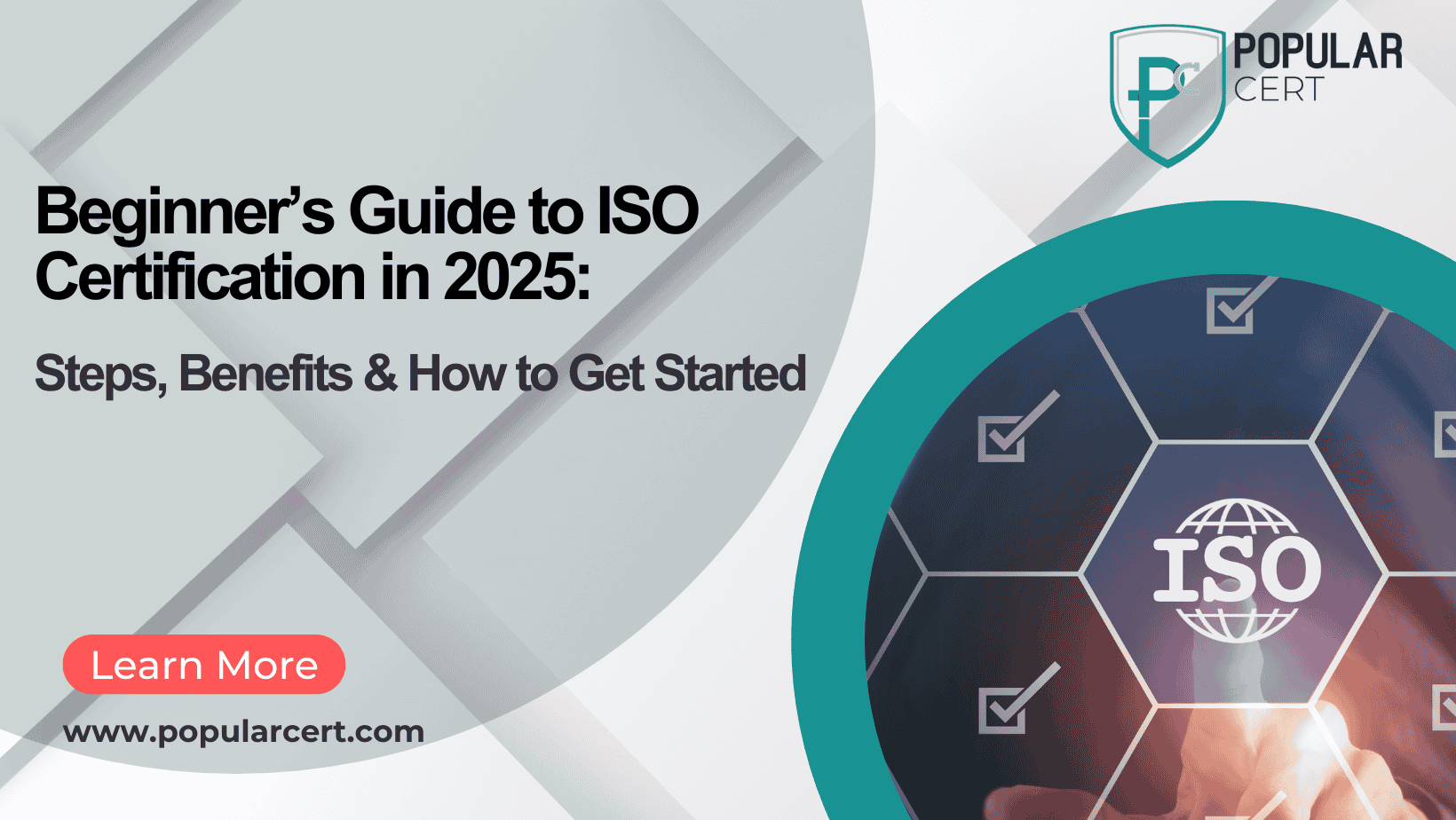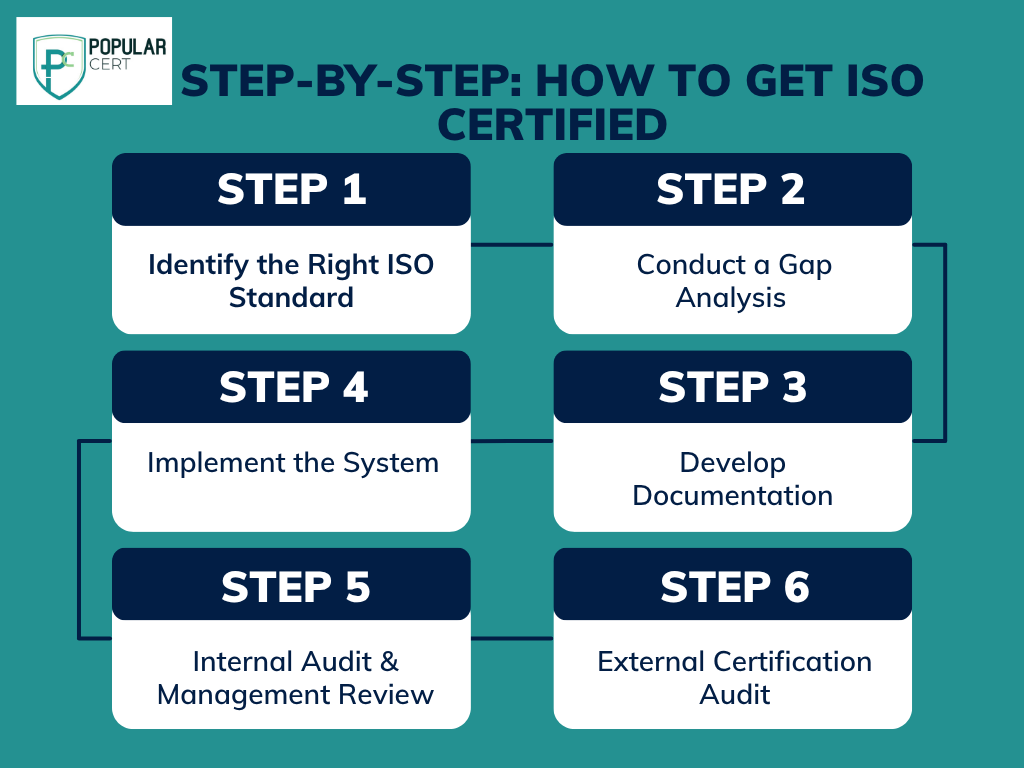Beginner’s Guide to ISO Certification in 2025: Steps, Benefits & How to Get Started

Introduction: Why ISO Certification Matters More Than Ever
Today, trust, rules, and quality aren’t just perks; they’re what keep a business afloat or help it grow. No matter if you’re a solo freelancer or a fast-expanding firm, an ISO badge has turned into the global handshake that signals credibility. It tells customers, watchdogs, and trade partners alike that you follow rules accepted around the world.
Still, most companies-especially newbies-feel lost before they even open the first checklist. This guide is here to light the way. In plain terms, we’ll explain what ISO Certification means, walk you through the steps to gain it, and show why thousands of firms now lean on Popularcert as their go-to mentor.
What is ISO Certification?
ISO stands for the International Organization for Standardization, a worldwide group that writes rules so goods and services are safe, efficient, and consistent. When an independent body stamps your company with an ISO certificate, it means you meet the benchmarks spelled out in that standard.
For example:
- ISO 9001: Quality Management Systems
- ISO 14001: Environmental Management
- ISO 27001: Information Security
- ISO 45001: Occupational Health and Safety
- ISO 22000: Food Safety Management
Earning an ISO sticker proves your company is serious about quality that never quits, constant fine-tuning, and sticking to time-tested steps.
Why Getting ISO-Certified Makes Sense in 2025
More firms are jumping on the ISO bandwagon this year, and the reasons are obvious:
- Build Trust with Every Badge: Shoppers, investors, and watch dogs feel safer with a company that displays the ISO logo.
- Open Doors to Global Markets: Because the badge speaks the same language everywhere, moving into new territory is much easier.
- Win More Tenders and Contracts: Public agencies and private buyers now often list ISO proof near the top of their must-have list.
- Streamline Your Day-to-Day Work: ISO tools trim waste, cut errors, and nudge teams toward quicker, smoother output.
- Stay Compliant and Audit-Ready: Meet legal rules head-on, so surprise checks create little fuss and cost.
Types of ISO Standards Worth Considering
Types Of Certification
- ISO Certification
- ISO 9001 Certification
- ISO 14001 Certification
- ISO 45001 Certification
- ISO 22000 Certification
- ISO 27001 Certification
- ISO 17025 Certification
- ISO 13485 Certification
- ISO 20000-1 Certification
- ISO 22301 Certification
- ISO 50001 Certification
- ISO 37001 Certification
- IATF 16949 Certification
- ISO 29001 Certification
- ISO 31000 Certification
- ISO 20121 Certification
- ISO 10002 Certification
- ISO 41001 Certification
Get Free Consultation
Our Clients


















Not every aim fits under one rule book, so ISO offers separate guides for different sectors. These three are among the most popular:
-
ISO 9001 - Quality Management
A classic for almost any field. It keeps your products or services steady and customers smiling. -
ISO 14001 - Environmental Management
Popular with factories, construction teams, and chemical companies, it helps them make smarter, planet-friendly decisions. -
ISO 27001-Information Security
Absolutely essential whenever companies deal with private or classified information. -
ISO 45001-Occupational Health and Safety
Designed for tough environments where accidents put lives on the line. Examples include construction, oil-and-gas, and busy logistics yards. -
ISO 22000-Food Safety
Critical for anyone in food production, processing, delivery, or storage-from plants and restaurants to farm co-ops.
Step-by-Step: How to Get ISO Certified
Getting an ISO certificate may seem daunting at first, but Popularcert breaks the journey into easy-to-grasp steps and stays with you all the way.

Step 1: Identify the Right ISO Standard
Start by lining up your day-to-day work with the standard that best matches it. Still in doubt? Take a no-charge call with the Popularcert team and let them point you in the right direction.
Step 2: Conduct a Gap Analysis
An industry expert will review your process side-by-side with the chosen standard. Their report flags gaps, drafts a simple plan, and makes sure nothing gets missed.
Step 3: Develop Documentation
Policies, manuals, SOPs, and controls must be written or updated. Using Popularcerts plug-in templates saves time and keeps every page compliance-ready.
Step 4: Implement the System
Now train staff, tweak workflows, and follow the procedures you just documented.
Step 5: Internal Audit & Management Review
Before the outside audit, run a quick in-house check, fix any last issues, and invite leadership to examine results.
Step 6: External Certification Audit
After scheduling the stage-one review, the certifying body visits for record checks and interviews. In stage two, they observe operations on the floor; if all looks solid, you’ll be issued a certificate good for three years.
Cost, Timeline, and Validity
Cost: fees change based on size and scope, yet Popularcert bundles sensible packages for small businesses.
Timeline: most projects finish in four to eight weeks, as long as everyone keeps their end up.
Validity: certificates last three years and include brief yearly checks to keep you moving forward
Why Popularcert Is the Right Partner for Your ISO Journey
With dozens of certifiers out there, you may wonder why firms across India, the Middle East, and Africa keep choosing Popularcert. Here’s what sets them apart:
- End-to-End ISO Certification Support: Popularcert guides you every step of the way, from initial talks through paperwork, rollout, and final audits.
- ISO Experts Across Industries: Manufacturing, IT, food, or healthcare- their advisors know the daily hurdles you face in your sector.
- Fast & Cost-Effective Process: People choose Popularcert because its ISO packages move quickly, stay budget-friendly, and never skimp on quality.
- Global Reach, Local Support: Active in over twenty nations, Popularcert blends worldwide standards with knowledge that feels familiar to your community.
- 24/7 Support & Post-Certification Help: Certification isn’t the finish line. You’ll find help around the clock with surveillance reviews, renewals, and system upgrades.
Click here to schedule a free ISO consultation with Popularcert
Common Myths About ISO Certification
1. ISO Is Just for Huge Corporations
Not true. Small and mid-sized companies tap into real gains once they adopt the ISO way.
2. It’s Only Paperwork
Success shows in smoother, leaner workflows, not in a filing cabinet full of untouched sheets.
3. We Can’t Afford It
With Popularcerts flexible plans, the ISO journey fits most budgets without stretching cash flow.
Final Thoughts: ISO Certification Builds Real Trust
Winning an ISO Certification is much more than a flashy logo on your website. It’s proof your team cares about quality, people own their tasks, and lessons get added every day.By 2025 tight budgets and tougher customers will make that logo a must, not a nice-to-have.
Whether you are launching a new system or renewing the old one, Popularcert walks with you from start to finish.
Get ISO Certified with Confidence - Choose Popularcert
Join over 1,000 companies across many fields that rely on Popularcert for speedy, dependable, and globally accepted ISO certificates.
- Free Consultation
- Industry-Specific Guidance
- Complete Documentation Support
Book Your Free Consultation Now
GET A FREE CONSULTATION NOW
FAQs
Is ISO certification mandatory?
Legally no, yet most clients, auditors, and purchasing groups expect you to have it.
Can a startup apply for ISO?
Absolutely. An early ISO badge gives new ventures instant trust and sharper processes.
How long does ISO certification take?
Most projects finish in 4 to 8 weeks, though every firm and system moves at its own pace.
What's the difference between ISO certification and accreditation?
Certification proves you meet the standard; accreditation means the certifying body itself is officially recognized.
What happens after getting certified?
Routine surveillance audits are held each year to check that you stay on course.
